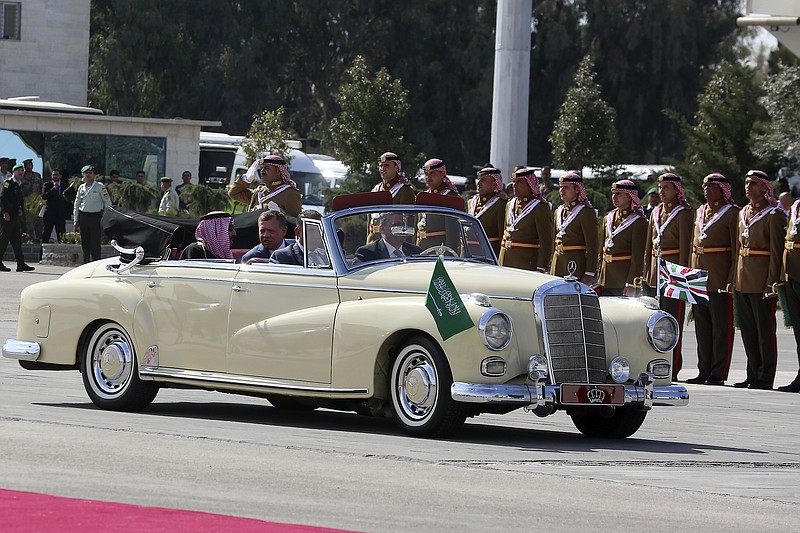DEAD SEA, Jordan (AP) - Arab leaders "realize the urgency" of tackling long-running regional crises, from war to high unemployment, Jordan's foreign minister said Monday after chairing a meeting of his counterparts from the region.
Ayman Safadi said he and his colleagues endorsed more than a dozen policy resolutions, including several on the Israeli-Palestinian conflict, that are to be adopted Wednesday by heads of state of the 22-member Arab League at their annual gathering.
The summit, hosted this year by Jordan, comes at a time when festering crises have "led to an erosion in the level of trust that people have in the regional Arab order, in the Arab League," Safadi told reporters. "So there is a realization of that, of the difficulty."
Despite calls for unity, Arab League member states remain divided on key issues, including the six-year-old civil war in Syria.
The league suspended Syria in 2011, several months after a popular uprising against President Bashar Assad that quickly turned into a brutal civil war. Assad hasn't been invited to a summit since then, and Arab League member states disagree on his political fate, if any, if fighting ends one day.
Regional power house Saudi Arabia, led by King Salman, supports the Syrian opposition, while Egypt, fearful of Islamic militants among the rebels' ranks, has pushed for a political solution that might keep Assad in power. Saudi-Egyptian relations have been tense in recent months.
The Saudi monarch arrived in Jordan on Monday to a lavish airport welcome, descending from his aircraft by escalator before being greeted by Jordan's King Abdullah II. The ceremony included troops on camel back, a vintage cream-colored Mercedes convertible and cannon salutes.
The two monarchs are to sign several bilateral agreements during Salman's visit. Saudi Arabia is one of Jordan's main financial backers, and Jordan desperately needs more foreign aid amid a continuous economic downturn, including rising unemployment and public debt.
This year's summit is being held six years after the Arab Spring uprisings that raised initial hopes for greater freedoms in a region still largely ruled by autocrats. Instead, the upheavals led to violent conflict and crackdowns in many parts of the region.
Safadi, the foreign minister, said he expects the summit to signal a readiness for change.
"I think this summit has confirmed and will confirm ... that Arab leaders, the Arab world, need to work together and realize the urgency of working together" on providing solutions that will offer hope to people, he said.
David Schenker, an analyst at the Washington Institute for Near East Policy think tank, said fear of chaos now appears to override demands for political or economic reform. "The general sense of the population is that they are not pushing back a great deal against the retrenchment of the authoritarians," said Schenker.
He said people in more stable countries, such as Jordan and Egypt, "are pleased their states don't look like Syria, Libya, Iraq or Yemen, even if economies are moribund and their political expression is dramatically limited."
The Israeli-Palestinian conflict, overshadowed by the aftermath of the Arab Spring, is high on the agenda at this year's summit. The leaders meet at the Dead Sea, with a view of the Israeli-occupied West Bank on the opposite shore.
Jordan's king has an interest in getting the summit to reaffirm traditional positions on the conflict ahead of his White House meeting next month with President Donald Trump.
In previous comments, Trump stopped short of endorsing the idea of a two-state solution - a state of Palestine to be established alongside Israel - and said he would move the U.S. Embassy in Israel to contested Jerusalem. In recent weeks, there were signs that an embassy move is no longer imminent.
The Palestinians want to set up a state in east Jerusalem, the West Bank and Gaza Strip, lands Israel captured in 1967.
Jordan has a stake in helping to end the conflict; it has a large Palestinian population and serves as custodian of a major Muslim-run shrine in Jerusalem that is also revered by Jews as their holiest site.
Several of more than a dozen policy resolutions endorsed Monday by the Arab foreign ministers deal with the Palestinian issue, said Safadi.
He said the ministers rejected "any unilateral steps that jeopardize the historic and legal status" of Jerusalem, an apparent reference to a possible U.S. Embassy move.
"On the Palestinian issue, the resolutions are based on a clear vision toward a peace that leads to the establishment of a Palestinian state on the 67 borders," he said.
